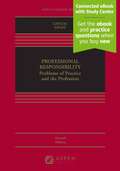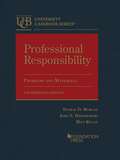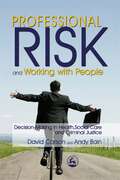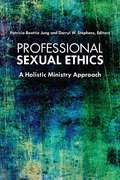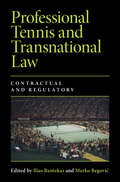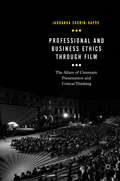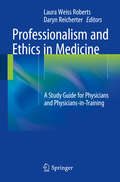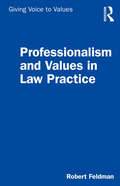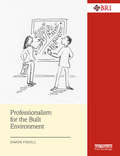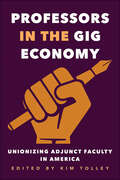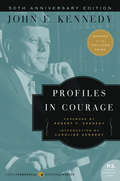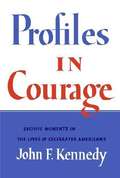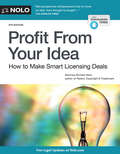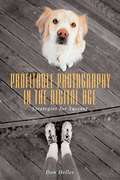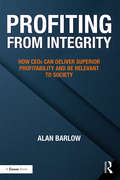- Table View
- List View
Professional Responsibility: Problems Of Practice And The Profession (Aspen Casebook Series)
by Nathan M. CrystalKnown for helping students develop the ability to make sound judgments and to develop a philosophy of lawyering, the concise Professional Responsibility: Problems of Practice and the Profession, Seventh Edition, is adaptable to a host of teaching styles. Scores of realistic problems call on students to develop a cogent philosophy of lawyering as they master basic concepts and prepare for the MPRE. Modular, flexible organization allows professors to adapt the material to a variety of courses and clinical programs. In particular, the book is structured to enable instructors to present the materials doctrinally or by area of practice.
Professional Responsibility: Problems and Materials (University Casebook Series)
by Mitt Regan Thomas Morgan John DzienkowskiThe 14th Edition of Professional Responsibility: Problems and Materials continues the traditions that have made this book a leader in its field for over 45 years. Built around problems, the book asks students to think about how they should behave in challenging, concrete settings. <p><p> The 14th Edition remains flexible enough to use in an overview course and challenging enough to use in ethics courses focused on particular areas of practice. It comprehensively addresses the ABA Model Rules of Professional Conduct, but also deals with additional issues raised in the Restatement (Third): The Law Governing Lawyers and in state rules that illustrate different ways to regulate lawyer conduct. <p><p> Perhaps most important, the 14th Edition keeps up with a rapidly-changing legal profession and with changes in lawyer regulation that respond to new developments. The book considers how the Covid-19 pandemic has changed the potential for virtual lawyer practice and increased tolerance of practice from outside a lawyer’s licensing jurisdiction. It examines the protection of confidential client information in a world where potential hackers threaten lawyer data and it introduces forms of litigation finance that may revolutionize how firms handle cases. It expands coverage of lawyer counseling and responds to issues of diversity, and it deals with Utah’s Regulatory Sandbox and Arizona’s rule changes that, even now, let regulators see new forms of practice take shape and assess the risks and benefits of the possible new future. <p><p> Since 1976, the authors of Professional Responsibility: Problems & Materials have helped students prepare to respond to professional challenges they will meet upon graduation, but also to understand how their profession and its challenges are changing. The new 14th Edition continues to meet those objectives.
Professional Risk and Working with People: Decision-Making in Health, Social Care and Criminal Justice
by David Carson Andy BainProfessional Risk and Working with People provides advice on assessing and managing risks for all those employed to take risks with or on behalf of other people. The authors explore issues of risk assessment and management that provides readers with a broad knowledge of risk practices that can be applied across a range of disciplines. They detail the benefits of risk as well as the potential harm and explain relevant legislation and concepts of negligence in clear and accessible language. Examples of risk policies, systems and effective judgement in managing complex risk decisions are also included. In the current climate of blame and readiness to pursue legal action against professionals, this book will prove essential reading for all practitioners who come into contact with risk, including doctors and other health and care professionals, probation officers and social workers. Leaders of professional courses and their students will also find this an invaluable guide.
Professional Secrecy of Lawyers in Europe
by The Bar of BrusselsThis book examines the lawyer's duty of professional secrecy (also known as the attorney-client privilege) in the twenty-seven Member States of the European Union, the three Member States of the European Economic Area, and Switzerland. It provides valuable information for those working on transactions or litigations which involve several countries - they can use this book to find out to what extent any information shared with or any advice received from a lawyer is protected in each of these countries.
Professional Sexual Ethics: A Holistic Ministry Approach
by Patricia Beattie Jung Darryl W. StephensSexual health is an essential part of maintaining professional relationships in ministry. Focusing on implications for the practice of ministry, this book engages all dimensions of theological education and academic disciplines. Each chapter includes an analysis of common ministry situations, discussion questions, practical guidelines, and resources for further study. The volume is ideal for use in courses on professional ethics for ministry, advanced leadership training, and continuing education for clergy.
Professional Skills in Radiology
by Sally AyesaPracticing as a radiologist is about more than image interpretation. Professional Skills in Radiology provides a concise handbook of essential non-interpretative skills a medical imaging doctor should possess. The book explores important professional development skills needed to work with diagnostic and procedural radiology patients, within healthcare multidisciplinary teams and in the community. It also provides a resource to bring together important concepts in evidence-based practice, research and quality assurance, medical education, advocacy and ethical practice, and cultural safety. Professional Skills in Radiology will be an excellent companion resource for training and consultant radiologists, containing practice questions to help prepare for fellowship/board examinations or interview panels.
Professional Tennis and Transnational Law: Contractual and Regulatory
by Ilias Bantekas Marko BegovićThis book examines the intersection of professional tennis and legal regulation, unveiling a fascinating world where tennis meets domestic, international and transnational law, and showing the many ways these legal frameworks impact tennis. Filled with firsthand accounts of the legal landscape and its implication on tennis, the work provides an accessible, engaging portrait of the tennis ecosystem that is equally suited for academics, athletes, sports lawyers and journalists. It is an essential read for those working within sports law generally, and the tennis industry specifically. This title is also available as Open Access on Cambridge Core.
Professional and Business Ethics Through Film: The Allure Of Cinematic Presentation And Critical Thinking (Palgrave Studies In Business, Arts And Humanities Ser.)
by Jadranka Skorin-KapovThis book considers ethical issues arising in professional and business settings and the role of individuals making decisions and coping with moral dilemmas. Readers can benefit from engagement in filmic narratives, as a simulated environment for developing a stance towards ethical challenges. The book starts by elaborating on critical thinking and on normative ethical theories, subsequently presenting the structure and cinematic elements of narrative film. These two avenues are tools for evaluating films and for discussions on various ethical problems in contemporary business, including: the corporate and banking financial machinations (greed, fraud, social responsibility); workplace ethical challenges (harassment, violence, inequity, inequality); professional and business ethical challenges (corruption, whistleblowing, outsourcing, downsizing, competition, and innovation); environmental and social issues; international business and human rights; and personal responsibility and identity challenges due to career pressures, loss of privacy and cyber harassment, and job structure changes in light of changing technology.
Professionalism and Ethics in Medicine
by Laura Weiss Roberts Daryn ReicherterProfessionalism and Ethics in Medicine: A Study Guide for Physicians and Physicians-in-Training is a unique self-study guide for practitioners and trainees covering the core competency areas of professionalism, ethics, and cultural sensitivity. This novel title presents real-world dilemmas encountered across the specialties of medicine, offering guidance and relevant information to assist physicians, residents, and medical students in their decision-making. The text is divided into two parts: Foundations and Questions with Answers. The first part provides a substantive foundation of knowledge in the principles, scholarship, policy guidelines, and decision-making strategies of the modern health professions. The second part assists practitioners and trainees in preparing for the complex issues that arise each day in the settings where health professionals work and train - clinics, research centers, educational contexts, and communities. Developed by renowned leaders in a broad range of clinical fields, Professionalism and Ethics in Medicine: A Study Guide for Physicians and Physicians-in-Training is a major, invaluable contribution to the literature and an indispensable reference for clinicians at all levels.
Professionalism and Values in Law Practice (Giving Voice to Values)
by Robert FeldmanThis book presents practical advice to law students and those entering and now working in the legal profession that will help them to reconcile who they are as a person with the demands and opportunities of a legal career. The book sets out a clear framework and practice examples for: (i) defining “success”, (ii) understanding the role of a professional in relation to clients, colleagues, adversaries and community, (iii) reconciling demands of practice within ethical rules and norms, business considerations and personal values and (iv) building a values-centered, economically viable practice and reputation. Complete with practical advice and experiences that produce and reinforce a holistic approach, this book provides invaluable support for second- and third-year law students and lawyers in practice to establish elusive work-life balance over the course of a legal career.
Professionalism for the Built Environment (Building Research and Information)
by Simon FoxellIn the aftermath of the Grenfell Tower tragedy, this new book provides thought provoking commentary on the nature of the relationship between society, the prevailing economic system and professionalism in the built environment. It addresses the changing responsibilities of professionals and in particular their obligation to act in the wider public interest. It is both an introduction to and an examination of professionalism and professional bodies in the sector, including a view of the future of professionalism and the organisations serving it. Simon Foxell outlines the history of professionalism in the sector, comparing and contrasting the development of the three major historic professions working in the construction industry: civil engineering, architecture and surveying. He examines how their systems have developed over time, up to the current period dominated by large professional services firms, and looks at some options for the future, whilst asking difficult questions about ethics, training, education, public trust and expectation from within and outside the industry. The book concludes with a six-point plan to help, if not ensure, that the professions remain an effective and essential part of both society and the economy; a part that allows the system to operate smoothly and easily, but also fairly and to the benefit of all. Essential reading for built environment professionals and students doing the professional studies elements of their training or in the process of applying for chartership or registration. The issues and lessons are applicable across all building professions.
Professionalism in Medicine: A Case-based Guide for Medical Students
by John Spandorfer Charles A. Pohl Susan L. Rattner Thomas J. NascaLearning medical professionalism is a challenging, evolving, and life-long endeavor. Professionalism in Medicine: A Case-Based Guide for Medical Students helps begin this process by engaging students and their teachers in reflection on cases that resonate with the experiences of life in medicine. Through the book's seventy-two cases, commentaries, videos, and literature-based reviews, students explore the many challenging areas of medical professionalism. Readers will appreciate the provocative professionalism dilemmas encountered by students from the pre-clinical years and clinical rotations and by physicians of various specialties. Each case is followed by two commentaries by writers who are involved in health care decisions related to that case, and who represent a wide variety of perspectives. Authors represent 46 medical schools and other institutions and include physicians, medical students, medical ethicists, lawyers, psychologists, nurses, social workers, pharmacists, health care administrators, and patient advocates.
Professionelles Handeln und Entscheiden in den Sozialen Diensten der Justiz: Eine strukturanalytische Untersuchung
by Bernd KammermeierDas Aufgabenfeld der Sozialen Dienste der Justiz stellt hohe Anforderungen an die professionell Handelnden innerhalb der Bewährungs- und Gerichtshilfe sowie der Führungsaufsicht. Dieses Buch macht das Handlungswissen und die daraus resultierenden Entscheidungslogiken der professionell Handelnden in den Sozialen Diensten der Justiz zum Gegenstand einer quantitativ und qualitativ angelegten Untersuchung. Handlungswissen wird in dieser Studie als das Wissen definiert, welches den professionell Handelnden einerseits von den Institutionen der Sozialen Dienste der Justiz zur Verfügung gestellt wird und andererseits bei den professionell Handelnden durch die Konfrontation mit der Praxis entsteht. Es geht darum, zu erforschen, welches Handlungswissen den professionell Handelnden von den Institutionen der Sozialen Dienste der Justiz vorgegeben wird und welche Entscheidungen sich durch die Anwendung dieses Handlungswissens für die Betroffenen von Bewährungs- und Gerichtshilfe sowie der Führungsaufsicht ergeben können. Mittels einer integrativen Inhaltsanalyse und einer qualitativen Befragung von Experten/Expertinnen der Sozialen Dienste der Justiz wird erforscht, wie das Handlungswissen der professionell Handelnden und die sich daraus ergebenden Entscheidungslogiken einen Eingang in theoretische Überlegungen zur Ausgestaltung der Sozialen Dienste der Justiz finden können.
Professors in the Gig Economy: Unionizing Adjunct Faculty in America
by Kim TolleyThe Uber-ization of the classroom and what it means for faculty.One of the most significant trends in American higher education over the last decade has been the shift in faculty employment from tenured to contingent. Now upwards of 75% of faculty jobs are non-tenure track; two decades ago that figure was 25%. One of the results of this shift—along with the related degradation of pay, benefits, and working conditions—has been a new push to unionize adjunct professors, spawning a national labor movement. Professors in the Gig Economy is the first book to address the causes, processes, and outcomes of these efforts.Kim Tolley brings together scholars of education, labor history, economics, religious studies, and law, all of whom have been involved with unionization at public and private colleges and universities. Their essays and case studies address the following questions: Why have colleges and universities come to rely so heavily on contingent faculty? How have federal and state laws influenced efforts to unionize? What happens after unionization—how has collective bargaining affected institutional policies, shared governance, and relations between part-time and full-time faculty? And finally, how have unionization efforts shaped the teaching and learning that happens on campus?Bringing substantial research and historical context to bear on the cost and benefit questions of contingent labor on campus, Professors in the Gig Economy will resonate with general readers, scholars, students, higher education professionals, and faculty interested in unionization. Contributors: A. J. Angulo, Timothy Reese Cain, Elizabeth K. Davenport, Marianne Delaporte, Tom DePaola, Kristen Edwards, Luke Elliott-Negri, Kim Geron, Lorenzo Giachetti, Shawn Gilmore, Adrianna Kezar, Joseph A. McCartin, Gretchen M. Reevy, Gregory M. Saltzman, Kim Tolley, Nicholas M. Wertsch
Profiles in Courage
by John F. KennedyWritten in 1955 by the then junior senator from Massachusetts, John F. Kennedy's Profiles in Courage has served as a clarion call to every American. A collection of eight inspiring, unsung, and heroic acts by American patriots at different junctures in our nation's history, Kennedy's book became required reading and an instant classic and was awarded the Pulitzer Prize. Now, a half-century later, it remains a moving, powerful, and relevant testament to the indomitable national spirit and an unparalleled celebration of that most noble of human virtues.Along with vintage photographs and an extensive author biography, this book features Kennedy's correspondence about the writing project, contemporary reviews, a letter from Ernest Hemingway, and two rousing speeches from recipients of the Profile in Courage Award.
Profiles in Courage
by John Fitzgerald Kennedy"This is a book about that most admirable of human virtues--courage... and these are the stories of the pressures experienced by eight United States Senators and the grace with which they endured them--the risks to their careers, the unpopularity of their courses, the defamation of their characters, and sometimes, but sadly only sometimes, the vindication of their reputations and their principles." <P><P> During 1954-1955, John F. Kennedy, then a U.S. Senator, chose eight of his historical colleagues to profile for their acts of astounding integrity in the face of overwhelming opposition. These heroes include John Quincy Adams, Daniel Webster, Thomas Hart Benton, and Robert A. Taft. <P><P> Awarded the Pulitzer Prize in 1957, Profiles in Courage resounds with timeless lessons on the most cherished of virtues and is a powerful reminder of the strength of the human spirit.
Profiles, Probabilities, and Stereotypes
by Frederick SchauerThis book employs a careful, rigorous, yet lively approach to the timely question of whether we can justly generalize about members of a group on the basis of statistical tendencies of that group. For instance, should a military academy exclude women because, on average, women are more sensitive to hazing than men? Should airlines force all pilots to retire at age sixty, even though most pilots at that age have excellent vision? Can all pit bulls be banned because of the aggressive characteristics of the breed? And, most controversially, should government and law enforcement use racial and ethnic profiling as a tool to fight crime and terrorism? Frederick Schauer strives to analyze and resolve these prickly questions. When the law "thinks like an actuary"--makes decisions about groups based on averages--the public benefit can be enormous. On the other hand, profiling and stereotyping may lead to injustice. And many stereotypes are self-fulfilling, while others are simply spurious. How, then, can we decide which stereotypes are accurate, which are distortions, which can be applied fairly, and which will result in unfair stigmatization? These decisions must rely not only on statistical and empirical accuracy, but also on morality. Even statistically sound generalizations may sometimes have to yield to the demands of justice. But broad judgments are not always or even usually immoral, and we should not always dismiss them because of an instinctive aversion to stereotypes. As Schauer argues, there is good profiling and bad profiling. If we can effectively determine which is which, we stand to gain, not lose, a measure of justice.
Profiling and Serial Crime: Theoretical and Practical Issues in Behavioral Profiling
by Wayne PetherickProfiling and Serial Crime examines the principles of behavioral profiling and then applies them to serial crime. This book is a completely revised and updated edition of an excellent text on behavioral profiling and serial crime. It provides a theoretical and practical foundation for understanding the motivation and dynamics in a range of serial offenses. <P><P> Part I of the book deals with the history, crucial issues, methods, theory, and treatment in the mainstream media. Part II discusses serial crime in detail, including bullying, stalking, rape, murder, and arson. <P><P>The title of this edition reflects the focus on profiling as well as serial crime and has been updated throughout with the latest research. <P><P>New to this edition are five all-new chapters, including serial harassment and cyber-bullying and the motivations of victim and offender; two replacement chapters on serial rape and serial arson; enhanced pedagogy to keep students focused on what’s important; and new ancillary materials for both instructor and student. The book consists of ancillary online materials for instructors and students, including lecture slides, test bank and case studies. Numerous case examples are included to show the real world uses of behavioral profiling in investigations. <P><P> This book will appeal to professionals and students in criminal justice and forensic psychology programs, as well as those taking courses in criminal profiling, especially courses on serial crime.
Profit From Your Idea
by Richard StimYou've invented a great product and it's time for the next step. However, if you present an invention to a prospective buyer or licensee, it's no secret that your idea can be stolen. How can you draft an agreement that protects your interests? Turn to Profit From Your Idea to help you create, modify and understand nondisclosure agreements specifically for inventors. In addition to providing sample agreements and practical advice, this all-in-one guide helps you: understand the licensing process determine ownership rights work with agents effectively find potential licensees publicly show inventions without the risk negotiate a fair licensing deal draft a comprehensive licensing agreement deal with international licensing Disclosing your invention requires a balancing act: Presenting the best aspects of your invention while protecting the confidential aspects of your work. Use Profit From Your Idea to help you effectively maintain the necessary balance and minimize the risks of disclosure. The fully updated edition comes complete with the latest licensing case law and includes brand new FAQs, many from the author's popular blog, Dear Rich: Nolo's Patent, Copyright & Trademark Blog.
Profit From Your Idea
by Richard Stim AttorneyIt's no secret that inventors need to protect their secrets. If you present an invention to a prospective buyer or licensee, it can be stolen. The best way to protect yourself is with a nondisclosure agreement. But it's not enough to hand a company a one-size-fits-all nondisclosure agreement and expect a signature. The company may request modifications to the inventor's agreement, supply its own agreement or actually require an inventor to give up claims of confidentiality. This plain-English book helps inventors create, modify and understand nondisclosure agreements. In addition to providing sample agreements, it explains: the laws concerning trade secrets and their limitations the risks of proceeding without a nondisclosure agreement the dangers posed by waiver agreements what to do if a company won't sign an agreement which modifications help the inventor and which modifications can hurt the perils of disclosing to employees, contractors and attorneys the meaning of each of the legalese "boilerplate" provisions in nondisclosure agreements Disclosing your invention requires a balancing act: Presenting the best aspects of your invention while protecting the confidential aspects of your work. With this book an inventor can effectively maintain the necessary balance and minimize the risks of disclosure.
Profit From Your Idea: How to Make Smart Licensing Deals
by Richard StimLicense your invention without the risk -- protect your idea You’ve got a great idea and are ready to strike it rich. But finding a company you can trust, hashing out a fair licensing deal, then watching your idea hit the marketplace—well, you’ll need help. Turn to Profit From Your Idea. It will help you negotiate and draft a licensing agreement that will protect your interests. In the end, you’ll know all about: the licensing process your intellectual property rights ownership issues for inventor-employees working with licensing agents protecting confidential information finding potential licensees licensing overseas showing your invention safely negotiating your agreement reviewing changes to an agreement Disclosing your invention requires a balancing act: Presenting the best aspects of your invention while protecting the confidential aspects of your work. Use Profit From Your Idea to help you effectively maintain the necessary balance and minimize the risks of disclosure. The fully updated edition comes complete with the current licensing law and patent rules, as well as includes brand new FAQs, many from the author's popular blog, Dear Rich: Nolo's Patent, Copyright & Trademark Blog.
Profit From Your Idea: How to Make Smart Licensing Deals
by Richard StimAll you need to protect and profit from your invention You’ve got a great idea and you’re ready to strike it rich. Now, you need to find a company or partner you can trust, hash out a fair licensing deal, and get your idea to the marketplace. Profit From Your Idea will help you negotiate and draft a licensing agreement that protects your interests and maximizes your chances of earning a profit. With this all-in-one guide you’ll understand how to: navigate the licensing landscape protect your intellectual property rights sort out ownership rights work with licensing agents protect confidential information find and solicit potential licensees license overseas reveal your invention safely, and negotiate and update an agreement. The 10th edition is completely updated with the latest developments in licensing law and patent filing rules, and covers industry-standard Fair, Reasonable, and Nondiscriminatory (FRAND) licensing terms. With Downloadable Forms: download forms including license agreements, assignments, joint ownership agreements, and many more (details inside).
Profit with Honor: The New Stage of Market Capitalism
by Daniel YankelovichThis wise and optimistic book examines the rampant scandals that plague American corporations today and shows how companies can reverse the resulting climate of mistrust. By seizing the opportunity to address some of the nation's--and the world's--most serious problems, business can strengthen its reputation for integrity and service and advance to a new stage of ethical legitimacy. Daniel Yankelovich, a social scientist and an experienced member of the corporate boardroom, describes the toxic convergence of cultural and business trends that has led inexorably to corporate scandals. Yet he offers reassurance that opportunity exists for positive change. Creative business leaders can advance market capitalism to its next stage of evolution, building upon business norms that simultaneously emphasize the legitimacy of profit making and the importance of the care that companies give to employees, customers, and the larger society. The book asserts that American culture has abandoned its old tradition of enlightened self-interest, of "doing well by doing good. " A narrow legalism has taken over ("I didn't break the law; therefore I didn't do anything wrong"). Yankelovich argues that attempts to deal with such flawed ethical norms by means of more laws and regulations cannot succeed. He offers a series of case histories to show how and why stewardship ethics can strengthen individuals, corporations, the nation, and the world economy.
Profitable Photography in Digital Age: Strategies for Success
by Dan HellerThis groundbreaking resource demonstrates how to use digital imaging and the Internet as the cornerstone of a successful photography business. Topics covered include setting business goals, marketing, setting prices, selling prints, running a Web-based photography business, working with stock agencies, legally protecting images, and more. Both serious amateurs considering a start-up and established businesses looking for fresh approaches need this timely, relevant book.Allworth Press, an imprint of Skyhorse Publishing, publishes a broad range of books on the visual and performing arts, with emphasis on the business of art. Our titles cover subjects such as graphic design, theater, branding, fine art, photography, interior design, writing, acting, film, how to start careers, business and legal forms, business practices, and more. While we don't aspire to publish a New York Times bestseller or a national bestseller, we are deeply committed to quality books that help creative professionals succeed and thrive. We often publish in areas overlooked by other publishers and welcome the author whose expertise can help our audience of readers.
Profiting from Integrity: How CEOs Can Deliver Superior Profitability and Be Relevant to Society
by Alan BarlowThe case for a pro-integrity approach to business is due to endemic corruption, inadequacy of compliance and irrelevance of corporate social responsibility. It is demonstrated empirically that there is a direct causal relationship between companies operating with heightened integrity and their resultant superior profitability. For chief executive officers (CEOs) to achieve this, an innovative pro-integrity business model for companies to adopt is proposed, based predominantly on the author’s business experience. The model is demonstrated by application to a case study multinational corporation where the author was CEO. A considerable amount of what ordinarily would be highly sensitive commercial information is provided in the case study in a frank manner. Using the prointegrity business model which encompasses stakeholders, vision, integrity, leadership, staff and feedback, Alan Barlow explains the value and application of his approach. He draws on benchmarking research and a case study example to provide rigour and context to the model. The result is a compelling argument for a pro-integrity approach to business as an integral part of an organisation’s culture, communication and management practice. Profiting from Integrity provides a powerful evidence-based argument for chairmen, non-executive directors and shareholders, staff and other stakeholders to challenge incumbent CEOs as to why they are not leading their business with a pro-integrity approach and thereby delivering superior profitability.
